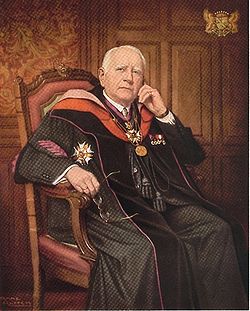
Albert Michotte
Encyclopedia

Brussels
Brussels , officially the Brussels Region or Brussels-Capital Region , is the capital of Belgium and the de facto capital of the European Union...
– June 2, 1965) was a Belgian experimental psychologist.
Certification
He enrolled at the University of Leuven at the age of sixteen, originally studying philosophy.He obtained his license in 1899 in the study of Physiology
Physiology
Physiology is the science of the function of living systems. This includes how organisms, organ systems, organs, cells, and bio-molecules carry out the chemical or physical functions that exist in a living system. The highest honor awarded in physiology is the Nobel Prize in Physiology or...
and the psychology of sleep, and in 1900, his doctorate
Doctorate
A doctorate is an academic degree or professional degree that in most countries refers to a class of degrees which qualify the holder to teach in a specific field, A doctorate is an academic degree or professional degree that in most countries refers to a class of degrees which qualify the holder...
in philosophy with a thesis on Spencer
Herbert Spencer
Herbert Spencer was an English philosopher, biologist, sociologist, and prominent classical liberal political theorist of the Victorian era....
's ethics.
Early Work
His interest was drawn toward experimental research, and so enrolled in the department of natural sciences where he joined the laboratory for two years, the same which had once been used by Arthur Van GehuchtenArthur Van Gehuchten
Arthur Van Gehuchten was a Belgian anatomist, born at Antwerp. He was professor in the faculty of medicine at the University of Leuven until the eruption of the War in Europe in 1914. He moved to England and taught biology at Cambridge University until his death. Van Gehuchten is especially...
.
It was during this time that he made his first scientific contributions: two publications on the histiology of the nerve cell.
After having a conversation with Désiré Mercier, founder of Leuven's laboratory of experimental psychology, was when he finally decided to dedicate himself to psychology.
He began working under Armand Thiéry, who had been the laboratory director since 1894.
Michotte wrote a publication on his research on tactual sense in 1905 based on his first experimental work.
Between 1905 and 1908, he spent one semester of each year in Germany, working first with Wilhelm Wundt
Wilhelm Wundt
Wilhelm Maximilian Wundt was a German physician, psychologist, physiologist, philosopher, and professor, known today as one of the founding figures of modern psychology. He is widely regarded as the "father of experimental psychology"...
at Leipzig
Leipzig
Leipzig Leipzig has always been a trade city, situated during the time of the Holy Roman Empire at the intersection of the Via Regia and Via Imperii, two important trade routes. At one time, Leipzig was one of the major European centres of learning and culture in fields such as music and publishing...
, then at Würzburg
Würzburg
Würzburg is a city in the region of Franconia which lies in the northern tip of Bavaria, Germany. Located at the Main River, it is the capital of the Regierungsbezirk Lower Franconia. The regional dialect is Franconian....
with Oswald Külpe
Oswald Külpe
Oswald Külpe was one of the structural psychologists of the late 19th and early 20th century.-Biography:...
. During this time he was also giving a course at Leuven on experimental psychology the other half of the year. His early work, done before World War I, was focused on logical memory and voluntary choice. Much of that work was heavily influenced by Külpe, through the employment of "systematic experimental introspection".

